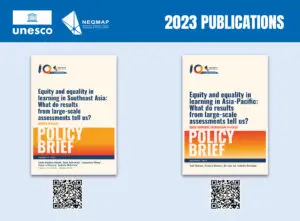
Good quality education, as emphasized in SDG4, should provide relevant learning outcomes for all. This includes a focus on learner-centred holistic development so that learners achieve the skills, values, attitudes and behaviours needed in today’s world. But education quality also requires a well-functioning coordinated approach by governments. With this in mind, the Network on Education Quality Monitoring in Asia-Pacific (NEQMAP) recently announced its five-year strategy (2020-2024) in monitoring the quality of education with two programmatic focuses: competency-based learning for students and education system alignment for effective and relevant learning outcomes.
On 30th June 2020, the NEQMAP Secretariat at UNESCO Bangkok hosted a webinar on ‘Introducing NEQMAP Strategy in Strengthening the Quality of Education in Asia-Pacific’ to discuss its updated strategy and to share experiences from Uzbekistan and the Philippines that reaffirm NEQMAP’s strategy on quality education.
Mainstreaming competency-based learning approach in Uzbekistan
Uzbekistan’s effort in mainstreaming competency-based learning and outcomes at the national level was presented by Mr. Asliddin Odilov, Head of the Directorate-General for Quality Assurance from State Inspectorate for Supervision of Quality Education in Uzbekistan. He spoke about how Uzbekistan was motivated to implement a competency-based approach by learning from other NEQMAP members’ successful educational reforms. Uzbekistan has established the National Centre for International Assessment in 2018, which accommodates 260 trainers and 7 international experts. The Centre has played a central role in helping teachers build capacity in competency-based pedagogies. Ultimately, due to the Centre’s works, Uzbekistan’s policymakers have begun to emphasize competency-based learning as one of the country’s core education policies. According to Mr. Odilov, “we achieved (the) government’s and policymakers’ understanding. Right now, when they speak, in one of every two sentences, they speak (about) competency [-based learning]…” The political will and support is a crucial step to ensure relevant, competency-based learning can be implemented at the national level.
System alignment efforts in the Philippines
Mr. Abelardo Medes, Chief Education Program Specialist from Education Assessment Division of Bureau of Education Assessment, shared his institutions’ efforts and various activities at the national level to ensure consistency between policies and practice that are crucial for promoting the quality learning outcomes. The activities include reviewing the national assessment plan to identify students’ intended learning outcomes and holding an annual “Live Item Writing Workshop” to develop better assessment items. Simultaneously, teacher training has been conducted so that teachers could use formative and summative assessments at the classroom-level, thereby translating competency-based learning approaches into practice. And to ensure alignment across education components, Mr. Medes noted that they have worked closely “with other bureaus and offices within the department to ensure that the curriculum is regularly reviewed and enhanced. We also have collaborated with partner agencies to assist us in reviewing the tested curriculum and re-mapping the tested scales within intended curriculum…” This cooperation is key to ensure consistency and alignment between policies and practices being smoothly implemented with timely interventions.
What have we learned and how can we move forward together?
These are only two practical examples of NEQMAP members that showcase efforts and strategies at the national level that highlight NEQMAP’s updated 2020-2024 strategy. The webinar reaffirmed the network’s vision to promote and strengthen education quality in the Asia-Pacific region through sharing experiences and learning from each other. Mr. Syeed Ahamed, representative of the NEQMAP Steering Group from International Development Department (IDD), Bangladesh, underlined the significance of NEQMAP members’ engagement and collaborative efforts with the network to optimise national strategies in the contexts of their respective countries, “different members of the network have different expertise. Members can then assess and align their institutes’ priorities with the network’s strategy to complement each other.”
The 2020-24 strategy also highlighted that the network will continue to engage members in activities through its three core pillars: capacity building, research and analysis and knowledge sharing. Ms. Ursula Schwantner, another representative of the NEQMAP Steering Group from the Australian Council for Educational Research (ACER), emphasized how member institutes can benefit from NEQMAP’s activities: “Through the research pillar, the network can provide current emerging trends for policy options to achieve SDG4; through the capacity building, it will provide long term institutional capacity development; and for knowledge sharing, it will showcase strategies and good practices for improving education quality.”
This multifaceted engagement, cooperation and collaboration across member institutes will be key for the Network to strengthen capacity and ultimately quality education. As the two country examples highlighted above, NEQMAP will continue to engage members in relevant activities in promoting key areas of competency-based learning outcomes and system alignment.
Written by: InJung Cho and Phenwilai [Um] Chaiyaporn
For more information, please contact: NEQMAP Secretariat at neqmap@unesco.org






